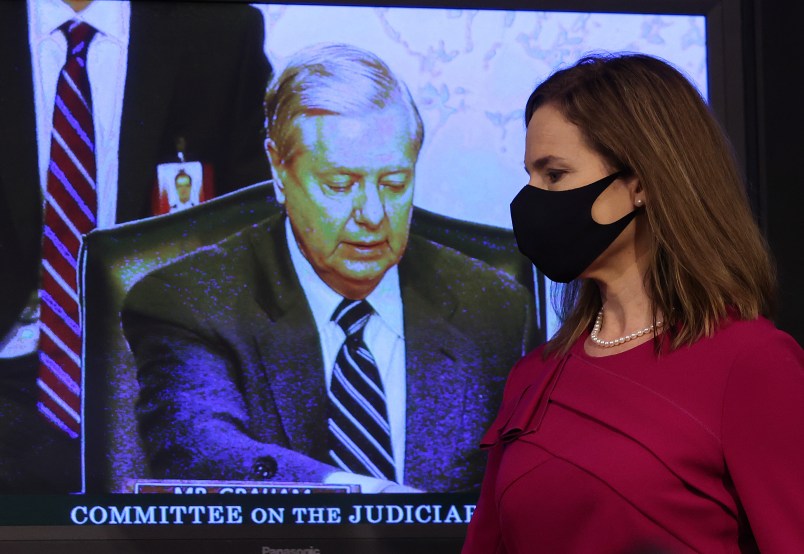In a move showing serious bad faith, Senate Republicans Monday used quotes from the late Justice Ruth Bader Ginsburg to justify their breakneck confirmation of Judge Amy Coney Barrett on the eve of an election.
Conveniently, they seemed to overlook Ginsburg’s dying wish: that whoever wins the election should get to choose her replacement.
Senate Judiciary Chairman Lindsey Graham (R-SC) first quoted the late justice in his opening statement.
“The bottom line is that Justice Ginsburg, when asked about this several years ago, said that a President serves for four years, not three,” he said. “There’s nothing unconstitutional about this process.”
Then, she was speaking about Republicans’ refusal to allow President Barack Obama’s Supreme Court nominee Merrick Garland to have a hearing. At the time, Republicans argued that the Court opening came too close to the election —269 days out — and that the next President should get to choose. Now of course, with a seat coming open only 46 days prior to the election, that problem has evaporated for many of the same lawmakers, including Graham.
Senator Chuck Grassley (R-IA) used a similar tactic, though with the additionally cynical layer of using a quote from Ginsburg’s eulogy for her good friend, the late Justice Antonin Scalia.
“On March 1, 2020, Justice Ginsburg delivered a eulogy for her friend Justice Scalia. Justice Ginsburg said, ‘We were different, yes, in our interpretation of written text. Yet one in our reverence for the courts, and its place in the U.S. System of governance,’” he quoted.
“The Senate is now tasked with carrying out perhaps its most solemn duty under the Constitution,” he continued. “As we go through this process, we should heed Justice Ginsburg’s words with a shared reverence for the Court and its place in our Constitutional system.”
Sen. John Cornyn (R-TX) used Ginsburg’s words to make a different point, as he brought up the concept of “court packing,” or adding seats to the Supreme Court. The idea has been a popular one with liberals still smarting over the injustice of Senate Majority Leader Mitch McConnell (R-KY) stealing Garland’s seat back in 2016.
“Well, they’ve said that if this confirmation proceeds, they intend to pack the Court with more justices who will turn the Supreme Court into a genuine second legislative body,” he said. “We heard what Justice Ginsburg had to say about that — that would be a terrible mistake.”
Cornyn’s is the most straightforward use of her words. Indeed, Ginsburg was asked about the idea of adding seats to the bench during a July interview with NPR, and pooh-poohed the idea.
“Nine seems to be a good number. It’s been that way for a long time,” she said. “I think it was a bad idea when President Franklin Roosevelt tried to pack the court.”
Ultimately though, Republicans’ gambit to act like Ginsburg signed off on their full-court press to get Barrett on the court is a direct contradiction to the late justice’s wishes.
Days before her death, as she became weaker, she dictated a note to her granddaughter:
“My most fervent wish is that I will not be replaced until a new president is installed.”







Republicans want the levers of power and wealth, the constitution be damned.
They’re utterly shameless.
The liars continue to dredge the depths of scum and obfuscation for political advantage.
The late Justice Ruth Bader Ginsburg would obviously have heartfully approved of our determination to pack the court with activist judges who will undo her life’s work.
This picks us up,now if the same can happen in Texas on ballot drop boxes.